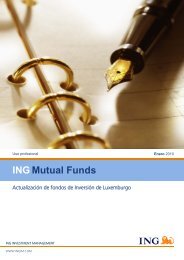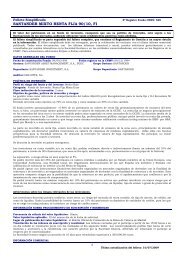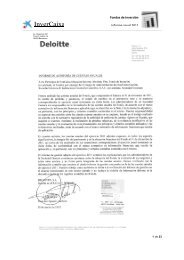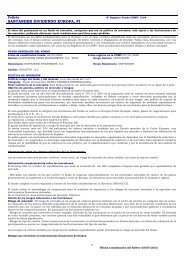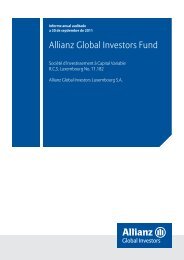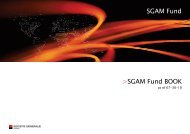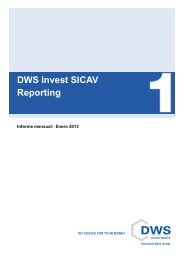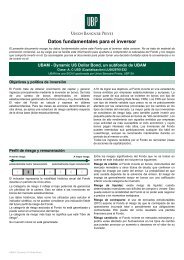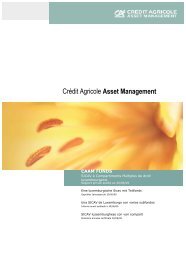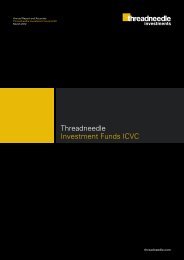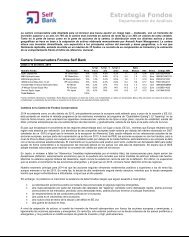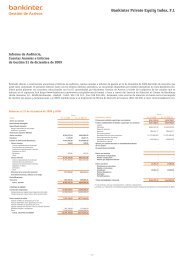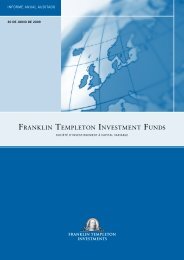Aberdeen Global II - Self Bank
Aberdeen Global II - Self Bank
Aberdeen Global II - Self Bank
- No tags were found...
Create successful ePaper yourself
Turn your PDF publications into a flip-book with our unique Google optimized e-Paper software.
Euro Aggregate BondFor the year ended 30 June 2011PerformanceFor the year ended 30 June 2011, the value of Euro Aggregate Bond -Z Accumulation shares increased by 0.67% compared to a decreaseof 0.13% in the benchmark, Barclays Capital Euro Aggregate Index.Source : BNP Paribas, Total Return, EUR.Fund name changeOn 27 July 2010 the Fund changed its name from <strong>Aberdeen</strong><strong>Global</strong> <strong>II</strong> - Euro Bond Fund to <strong>Aberdeen</strong> <strong>Global</strong> <strong>II</strong> - Euro AggregateBond Fund.Manager’s reviewInvestors had much to digest over the year. Core government bondyields rose steadily into 2011 from their summer/autumn lowsas greater levels of risk appetite returned to the table. Significantvolatility was experienced in core government bonds early in2011 due to ongoing political tensions in North Africa and theMiddle East, the tragic earthquake in Japan, concerns over theUS debt profile and a resurfacing of concerns over the eurozonesovereign debt crisis. These factors, particularly the latter eurozonewoes, ultimately weighed on investors minds and core yields fellsignificantly towards the end of the period.Unsurprisingly, the story in peripheral markets was very different.After an initial calm within peripheral European sovereign debtmarkets in early 2011, concerns took centre stage once again -with Greece requiring a second bout of IMF/ECB-backed financialassistance. Whilst remaining elevated throughout 2011, Europeanperipheral government bond spreads widened to record levels inMay and June as the crisis intensified. Credit fundamentals wereincreasingly overlooked over the year as markets and risk sentimentwere driven by events in peripheral Europe.During the year, the ECB became increasingly hawkish and increasedrates for the first time in nearly three years in April, moving theRefi rate (refinancing rate) up to 1.25%. The eurozone as a whole isexperiencing a recovery and the aggregate inflation level is abovetarget. However, the risk remains that tighter monetary policy inresponse to inflationary concerns in the core countries could lead todouble-dip recession in some of the lower-growth countries.Portfolio reviewThe Fund significantly outperformed over the year. Country selectioncontributed to performance, in particular our underweight positionsin Spain, Portugal and Ireland added value as peripheral Europeangovernment bonds underperformed ‘core’ countries such asGermany.However, security selection detracted value as sovereign debtconcerns overshadowed credit fundamentals. Our holdings insubordinated financials and our non-government holdings inperipheral markets were the main detractors. Duration and yieldcurve positioning also had a negative impact on performance aswe held an overweight position in 5-10 year securities.Our currency positioning was also a small negative; negativecontributions from positions in the US dollar versus commoditycurrencies outweighed the positive contribution from our longSwiss franc position.OutlookThe spread tightening that has occurred will likely continue in theshort-term due to positioning and favourable supply dynamics,particularly in the likes of Spain and Italy. However, in the mediumterm,the Greek situation is not sustainable and very visible publicanger about austerity measures may make it difficult for thesemeasures to be implemented fully. As a result, we will look touse further tightening to initiate short positions.With European fiscal imbalances and talk of sovereign defaultdominating markets, credit spreads are likely to remain volatileover the coming months. High severity tail risks abound and thedirection of markets over the short to medium term is as likely tobe driven by politics and public reaction to austerity as much as bycorporate fundamentals and economic growth. Indeed, in the US,Congress is approaching the August deadline for approval of anincrease in the US debt ceiling or risk having to begin defaulting onobligations. While a low probability, failure to agree would clearlyhave significant global implications. We maintain a small overweightposition in credit, believing that strong corporate fundamentals andrecovering economies will drive spreads tighter by the end of theyear.42 <strong>Aberdeen</strong> <strong>Global</strong> <strong>II</strong>Euro Aggregate Bond



